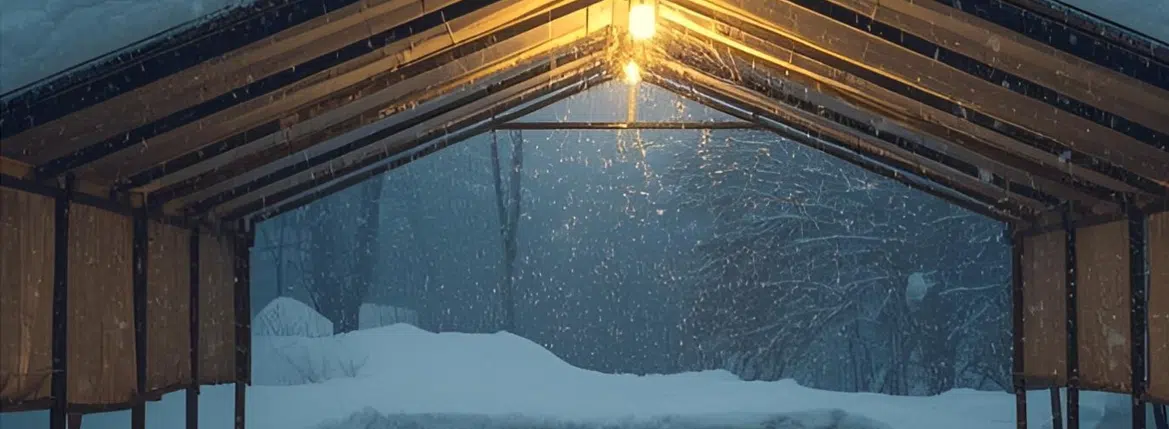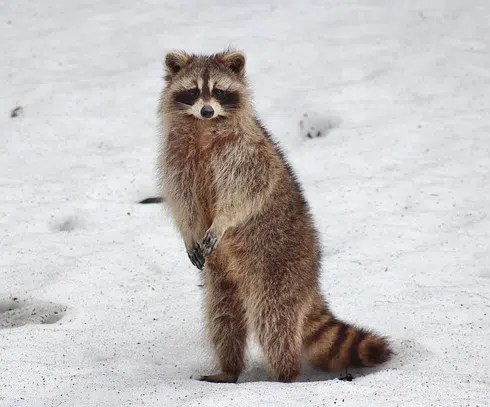Portable garages, tarp sheds, and construction canopies are often used for crucial winter storage of vehicles, equipment, and materials. These structures offer raccoons a perfect, insulated hideaway in the harsh Canadian cold, leading to immediate destruction of the fabric shell and contamination of valuable assets inside.

The risk is highest in late fall and during the first few weeks of snowfall. As temperatures drop, these sheltered spaces become irresistible, and a desperate raccoon will rip through vinyl and fabric walls in minutes to gain access.
Why Raccoons See Tarp Shelters as Ideal Winter Dens
- Wind and Cold Barrier
Even thin fabric traps air and blocks wind, creating a significantly warmer environment than the outside. When enclosed, these types of shelters become essential for a raccoon’s winter survival. While raccoons don't truly hibernate throughout the winter, they do enter torpor, a period of hours or days when their body temperature drops and the respiratory system slows down to conserve energy. - Ease of Access
Because these enclosures cannot be locked tightly, they are easily breached.- Claw and Tear
Raccoons use their strong claws to quickly tear through thin vinyl, polyester, or polyethylene fabrics. - Zipper/Velcro Exploitation
Raccoons have the dexterity to pull apart loose zippers or Velcro seals at door entrances. - Ground Gap Entry
They lift or push under loose bottom edges where the fabric meets the ground or snow.
- Claw and Tear
- Available Materials
The shelter often contains materials that can be used to build or line a den. This can include cardboard boxes, stored fabrics, packaging, or even seat foam from stored vehicles.
Signs of Raccoon Activity in Tarp Shelters
- Torn tarp corners or claw marks near entry flaps.
- Displaced vehicle covers, insulation, or shredded fabrics.
- Droppings or urine odour near vehicles or storage bins.
- Unexplained noises (scratching, rustling) especially at night.
- Tracks or muddy paw prints near shelter entrances.
Risks and Damages Caused by Raccoons in Tarp Shelters
Asset Contamination and Loss
- Vehicle Damage
Raccoons chew on electrical wiring, ignition components, or rubber hoses within stored vehicles, or rip up seat foam and upholstery for nesting material. - Inventory Contamination
Feces and urine contaminate stored materials (e.g., lumber, insulation, retail goods) that must then be discarded.
Structural Integrity Failure
The primary structure is the fabric, so a raccoon breach renders the shelter useless, accelerating moisture and weather damage to stored items inside.
Insurance and Liability (the Policy Gap)
Standard property insurance often excludes damage to contents inside temporary structures or damage caused by wildlife. The entire financial burden of repair and asset replacement falls directly on the owner.
Seasonal Risks: Are Tarp Shelters More Vulnerable in Winter?
- Raccoons actively seek warm, enclosed areas during cold months.
- Snow accumulation can collapse parts of the shelter, creating hidden spaces that raccoons use for dens.
- Reduced usage in winter means infestations often go unnoticed for a longer period.
Pro-Tip: Plan on routine mid-winter inspections of your structure's tarp integrity and anchor points.
Prevention Tips for Raccoon-Proofing Tarp Shelters
- Reinforce Entrances
Use heavy-duty zippers or clips and seal loose flaps. - Elevate Shelters:
Keep edges 6–8 inches off the ground and sealed to prevent a breach by raccoons digging under. - Remove Attractants
Ensure there’s no garbage, compost, or pet food nearby. If you store a vehicle in the shelter, remove all food items from it as well. - Inspect Frequently
Inspections, especially after storms or snowfalls can expose weaknesses to the structure. - Install Base Barriers
Heavy-duty mesh or skirting around bottom edges can re-enforce your structure and act as raccoon deterrents.
What to Do if Raccoons Are Already Inside
Whether you find raccoons in your fabric canopies, a raccoon nesting under tarp shelters, a raccoon problem in your vehicle storage area, or a raccoon nesting in portable garages, follow these guidelines when you find the animal(s):
- Avoid Direct Confrontation
Raccoons may become aggressive when cornered, especially mothers with kits (in the spring). - Call Professionals
Hawkeye’s licensed team ensures permanent removal—compliant, humane, and guaranteed. Relocation within the legal 1km radius almost inevitably fails due to raccoons returning. - Post-Removal Actions
Repair damaged tarp sections immediately to prevent re-entry and disinfect contents. Caution: Raccoon feces contains a number of pathogens and requires strict safety protocols.
Hawkeye’s Permanent Removal Approach
When dealing with raccoon removal from tarp shelters, the universal truth about trapping and relocation is that most raccoons will return to where they were captured. Ontario law dictates that the animal must be released within a 1km radius of the trap location. This leaves home and business owners in an endless cycle of trap and release.
Hawkeye Bird & Animal Control is the only wildlife control company in the GTA that offers permanent raccoon removal with a guarantee that the animal will not return.
FAQs: Raccoons in Vehicle Tarp Shelters and Fabric Canopies
Q: Can raccoons tear through heavy-duty tarp material?
A: Yes, raccoons can absolutely tear through all sorts of tarps. They are determined and strong animals with very sharp claws.
Q: Is it safe to start a vehicle stored in a tarp shelter that a raccoon has infested?
A: If you know that a raccoon is or has been living in your tarp shelter you should conduct a thorough inspection before starting your vehicle. Pop the hood, inspect the interior, and also check the exhaust for blockages.
Q: How can I prevent raccoons from climbing the support poles?
A: Realistically, you cannot prevent raccoons from climbing the poles of your tarp shelter without enclosing the structure in a heavy-duty mesh fence. If you are going to take this approach, the bottom of the fence should be buried at least a foot down to prevent wildlife from digging under.
Q: Will setting a trap inside the tent solve the problem?
A: Trapping the raccoon is the first step to solving the problem - but if you choose to release it within the required 1km limit, you will almost always have to deal with the same animal again.
Partnering with a professional experienced with wildlife control for fabric canopies is the best option, and permanent raccoon removal is the only solution that will guarantee that the raccoon will not return.
Q: Can I use repellents inside my tarp shelter?
A: You can certainly use repellents and some may even work for a few days. Unfortunately, raccoons are highly intelligent and quickly learn to ignore any repellent that poses no physical threat to them. And, with tarp shelters being semi-open structures, any scent-based repellent would have to be reapplied almost daily.
Q: Can raccoons damage stored tools or equipment?
A: Yes, raccoons can do a great amount of damage to anything with wiring and/or any type of insulation or upholstery (i.e., riding lawnmowers).
Hawkeye to the Rescue: Permanent Raccoon Removal in Toronto & the GTA
Temporary structures are prime winter targets, and the cost of damage to the shed or stored items can be substantial. A temporary fix isn’t a solution, and it certainly won't deter a desperate winter raccoon.
Protect your assets and contact Hawkeye Bird & Animal Control today for guaranteed permanent raccoon removal.
Looking for professional raccoon control in the GTA? Hawkeye's raccoon removal services are available all across Southern Ontario, including Toronto , Scarborough , Brampton, Vaughan , Markham , Ajax , Pickering , Newmarket , Etobicoke , Oshawa , and Mississauga .















